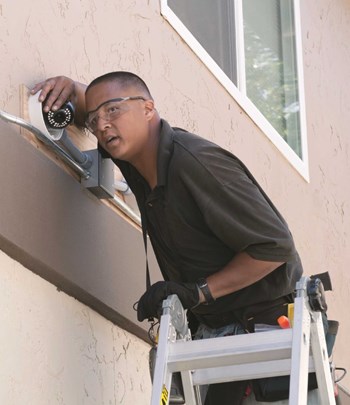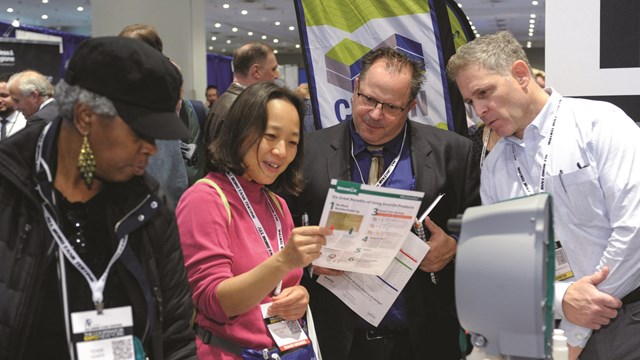
For most people, nothing is more important than knowing that they and their families are safe and secure in the place they call home. Boards, management and security firms all must work together seamlessly and cohesively to create that safe environment without making a building or community feel like a citadel. It can be a delicate balancing act, but with the right approach, it can be done.
Beginning the Process
In most cases, the board and managers will shoulder the burden of finding the right security firm with which to work. Larger communities may even have a security committee that can make recommendations for the board. “The managing agent and board should make decisions regarding security-related choices and service bids,” says Diane White, CMCA, of The Habitat Company, a management firm based in Chicago. “As residents of their community, board members are aware of security concerns due to their personal experience with issues in the building. Management is made aware due to feedback from residents combined with their own experience at other buildings.”
Finding the right security partner can take time but it starts with research and talking with other board members, managers and staff. “The best way to find the right security company is either through experience with vendors who have provided a high level of service in the past or by personal recommendations of colleagues who have had good experience with a particular vendor,” says White. “This will allow the association to partner with a vendor with a proven track record who can meet their needs.”
In addition to word of mouth and personal recommendations, researching through media and online information may also offer assistance in choosing a security firm. “The more you know, the better the decision,” says Lisa Evans, CMCA, AMS, PCAM, a property manager with Vanguard Community Management, based in Schaumburg.
Determining Your Needs
Every building and community is different, meaning they all have disparate and unique security needs. The best way to determine an effective plan for safety is to do a thorough assessment of those needs. With that in mind, it is important to perform “an on-site evaluation and assessment of the property,” says White. “This should include walking through both the interior and exterior of the building with the management team.”
In addition, detailed conversations with board members and management also will be necessary. “The consultant should also interview the management team to determine if they have any specific concerns regarding safety and security,” adds White. “The consultants should also assess all of the building’s policies and procedures, rules and regulations, existing security equipment, emergency plans, incident reporting forms in order to provide a comprehensive assessment. A professional consultant should provide the client with their assessment of the priority of each recommendation, as well as the anticipated cost. The association can then use this information to prioritize implementation of the recommendations.”
Victor Weisskopf, president of Admiral Security Services, based in Skokie, agrees that a detailed assessment of each property is imperative. “The physical layout of a building or property dictates a lot of those needs,” he says. “It will determine the number of staff needed on site and the duties and functions of those staff.”
In a single, 30- to 40-story high rise, the building likely will have two or three entrances. “You handle that one way versus five or six buildings spread out over a larger area,” says Weisskopf. “In a high rise, you’ll have a doorman, and it’s more about customer services, about taking packages and greeting people. In a gated community, it’s usually more about security patrols and things like that.”
The availability of budget dollars also will factor into the planning process. “Most people are realistic about what they need versus what they can afford,” says Weisskopf. And for some properties, the budget will have a significant impact on the kinds of services they can provide residents. “I have seen some buildings reducing their security because of the economy,” he continues. “Others, though, are increasing these services because the needs of the association have changed, or because they want to increase security levels in order to be more competitive.”
Jack Phillips, founder of Phillips Security Consulting in Chicago, agrees that budget is an integral piece of the puzzle. “You want to give them their best possible defense for what they can afford,” he says. “Whatever you can provide, it’s more than they had before. Anything you can improve on is important.”
Building the Best Plan
As with anything, the key to successfully building a strong security plan is information and communication. “With condo associations, it is all about communication,” says Phillips. And that communication includes having a lot of conversations with a lot of different people. “Find out what are residents really worried about,” Phillips says. “Have they heard things through [a community] Facebook [page]? You have to go to different sites and talk to people about what can be improved. Talk to nearby vendors and commercial sites and ask what they have seen.”
The more information available to the security firm—not just from boards and management but from residents, shop owners and business owners—the better able a security firm will be able to establish a history and patterns for that area and build a plan that is unique to those needs.
Clients and firms need to work as well to make sure they are focused on the real needs. For example, a building might not need a new surveillance camera; they might simply need to ensure that someone is watching the videos each day. Phillips says he has seen instances where crimes had taken place or were suspected but no one had watched the surveillance footage. Another building, he says, had an incident but no one recorded or reported it. Without that information and without an accurate, recorded history of past incidents, it can be difficult, if not impossible, to understand patterns and ultimately the real needs of the building or association.
“They think they need new, better doors” to prevent break-ins, Phillips says. “I’ve seen places that have had break-ins, and they go and get quotes for $15,000 worth of new doors.” But the doors are not addressing the real problems or security needs.
“It truly has to be a partnership,” says Weisskopf. “Everyone has to be on the same page and have a ‘we’re in this together’ mentality.”
Part of building that trust is consistency, he says. “We do that by striving to have a long-term staff. We have minimal turnover so residents see our same staff day in and day out. The board trusts our staff and then so do residents.”
Being there to address all concerns is also key to a successful relationship. “It’s about a prompt response to the concerns brought up by the client,” Weisskopf says. “We are an extension of their community and their service team. Being prompt and efficient is important.”
Phillips agrees that listening can go a long way toward building solid working relationships. “You want to have everyone be part of the process,” he says. “When we’re in a board meeting, we ask what each individual board member thinks. It’s important for them to speak as a whole group but also important for people to be able to express their ideas individually. Then you can go forward with everyone’s buy-in instead of doing something and then getting sign-off. It saves time and money.”
For buildings or associations that are on tight budgets, security firms may also be able to come up with lower cost solutions to some of their issues. That ability to think creatively can go a long way. “You can set up a Facebook page for a neighborhood watch,” Phillips says. Or have representatives from the board or building join CAPS, the Chicago Alternative Policing Strategy, which holds meetings to discuss crime and disorder in neighborhoods, and develop strategies to combat those problems. Or join Every Block, an online program that allows residents to share messages on incidents that have occurred or just ask questions about their neighborhood.
“Little things can make a difference,” Phillips says.
It is important, too, to help clients manage expectations, says Weisskopf. Some buildings may think “we are going to be sending them the head doorman from the Drake Hotel, but that’s not the function our person performs nor would they want it to be because that person has a different function.” So if one solution to security is to provide a doorman, all residents and board members need to remember that he or she is on site to protect individuals and property, not necessarily to grab the pizzas someone just had delivered. “If they want staff to go upstairs and fix a plumbing problem, then that person will not be at the front door doing his job,” Weisskopf says.
That is not to say that the doorman or security officer’s job is to act as the muscle. “It is a customer service job first and security second because they are interacting with residents frequently,” says Weisskopf. Protocols and procedures are in place to protect people but it comes down to the ability to interact well with residents that ensures a comfortable environment. “If things are security first, people feel like they are in a prison in their own homes.” Finding just the right balance is important.
Dollars and Sense
Whether things are going well or there is room for improvement in the security situation, it is important to evaluate the relationship regularly. “Boards should reassess their security service contracts on an annual basis,” says White. “This will allow them to determine if they are receiving the services that they were promised in their service contract. If not, they should meet with the vendor to discuss their concerns and develop an action plan. There is an advantage if an association is managed by a company who can leverage their purchasing power to negotiate service at a favorable rate.”
Evans agrees. “Contracts are generally re-evaluated annually or every two years,” she says. “Certainly associations can leverage better pricing if the same service is utilized for multiple buildings. Contracts should be negotiated separately for each association, however, to avoid any service issues should one association choose to terminate or not renew service.”
In order to get the best value for the dollar, Evans says, “Most competitive pricing can be negotiated by accepting multi-year contracts and locking in rates. This also helps establish and build rapport with the security staff and vendor.”
White adds, “In this economic climate many vendors are willing to negotiate their rates which will not compromise the safety of residents. However, the safety and security of residents should be one of the most important concerns of boards, and they should be prepared to allocate sufficient resources in their annual operating budgets.”
It’s no easy job keeping individuals and families feeling safe and secure, but with the right preparation, evaluations and execution of plans, it can be done efficiently and well. And that will help everyone sleep a lot easier each night.
Liz Lent is a freelance writer and a frequent contributor to The Chicagoland Cooperator.





Leave a Comment